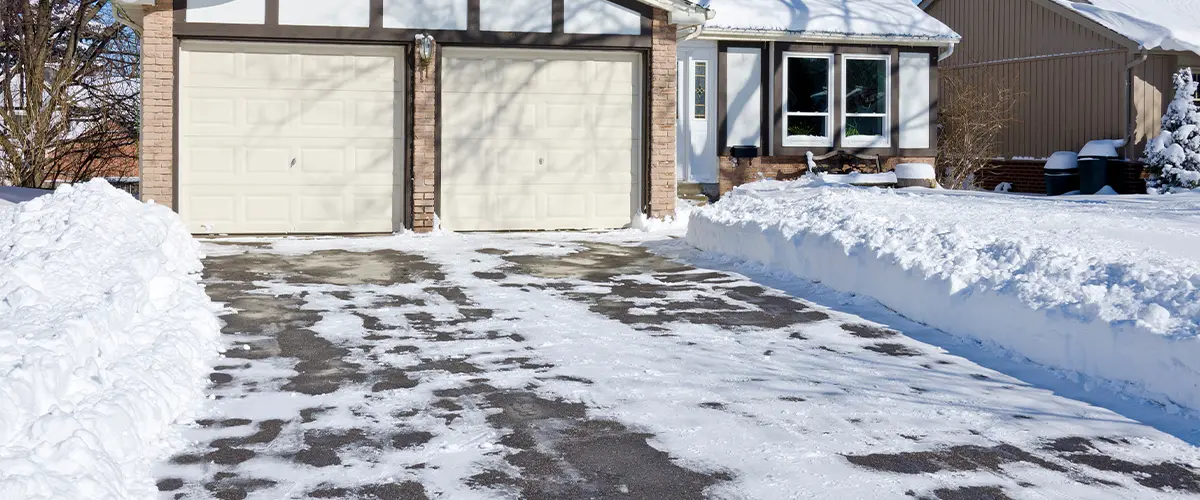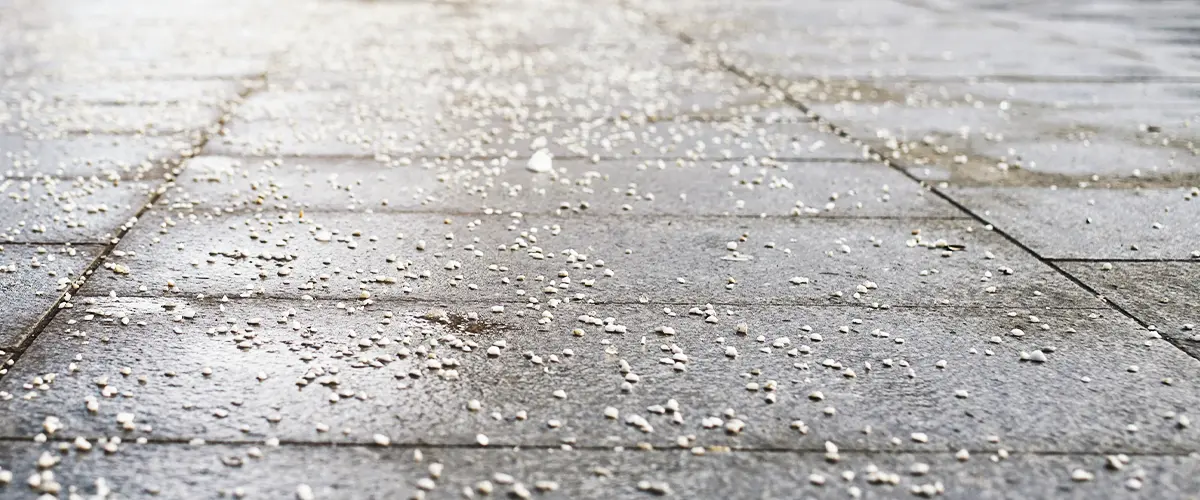A snowy driveway may seem a wintery delight, but did you know it may be wearing away your brand-new pavement? In fact, research reveals that winter weather conditions can amplify the risk of damage to driveways.
This blog aims to enlighten homeowners about how snow might lead their beautiful asphalt or concrete driveway to premature deterioration and what preventive measures they can take.
Dive in and arm yourself with knowledge for defending your newest investment from Old Man Winter’s icy grip.

Key Takeaways
- Snow can damage your driveway. It causes cracks from freezing and thawing.
- Clear the snow right away with a plastic shovel to keep ice off your driveway.
- Avoid using harsh deicers like salt that eat away at concrete driveways.
- Fix small cracks, clean oil spills, and clear debris to keep your driveway strong all year round.
How Snow Can Damage Your New Driveway
Snow can severely damage a fresh driveway through cycles of freezing and thawing. This alternating pattern expands and contracts your pavement, leading to cracks. In addition, melting snow creates water run-off that pools on the surface, causing asphalt or concrete deterioration over time.
The frequent use of deicers speeds up this process as these agents break down the materials in your driveway. Moreover, plowing snow off the driveway can cause scratches or gouges on its surface if not done carefully.
- Freezing and Thawing Damages your Driveway
Snow turns into water when it melts. This water can slip into the tiny cracks in your driveway. Then, if the weather gets cold again, this water will freeze. The freezing process makes the water grow bigger.
So, when it freezes inside of a crack in your driveway, it can make the crack larger. Over time, this freeze-and-thaw cycle can cause big damage to your driveway.
- Water Run-off and Pooling Damaging Driveway
Snow makes water runoff, and it can pool on your driveway. If this happens a lot, it can hurt your new drive path. Then you get pools of water that ice up as temperatures drop. This is bad for concrete driveways and asphalt pavements.
So, protect against winter weather damage! Keep an eye out for too much water after a snowfall impact or other flooding conditions. Snow removal helps avoid these problems and keeps your drive path safe.
- Use of Deicers Can Damage your Driveaway
Deicers can harm your driveway. Most deicers, like rock salt, snack on concrete driveways. They eat away the top layer of the surface and cause cracks. The cycle of freeze-thaw worsens these cracks.
Asphalt pavements face a similar fate, too. The melting snow from deicers seeps into small holes in the asphalt, making them bigger over time. Sometimes, this damage demands costly repair work or even full replacement.
To avoid such harsh outcomes, opt for less aggressive alternatives such as calcium magnesium acetate or sand to aid with ice removal.
- Driveway Damage from Snow Plowing
Plowing can hurt your driveway. A heavy shovel or a big snowplow machine could crack the asphalt or the concrete slabs, as they can chip or break if you hit them too hard. Also, the blades on some plows can scrape off the top layer of your driveway.
It’s best to use a lightweight plastic shovel for snow removal to avoid damaging your pavement.
Preventing Snow Damage to Your Driveway
Clearing Snow Properly to Protect Driveway Damage
- Use a lightweight plastic shovel: This type of shovel won't damage the surface.
- Clear the snow right away: This keeps ice from forming on your driveway.
- Always push the snow to one side: Doing this avoids creating flooding conditions when it melts.
- Be careful with using snowplowing services: Sometimes they cause asphalt pavement damage.
- Keep your shovel blade up: Don't let it scrape or nick your driveway's surface.
- Stay off the cleared areas: Walking or driving can pack down snow and make ice harder to remove.
- Tackle heavy snow in layers: Remove a few inches at a time to be more successful.
- Avoid all metal tools if possible: They can scratch or chip a concrete driveway or asphalt pavement.

Avoiding Harsh Deicers
Harsh deicers can harm your driveway. They create small cracks when they melt the ice. These cracks make a place for water to go in. The water then freezes and expands, making the crack bigger.
Over time, this leads to big gaps and holes that are costly to fix. Salt is one type of harsh deicer some people use on snow or ice, but it’s not great for driveways as it wears them down quickly.
So try other safer options such as calcium magnesium acetate (CMA) or sand for grip instead of salt next winter!

Regular Maintenance and Repairs
- Fix small cracks right away. They can grow bigger in winter and cause more damage.
- Fill in gaps with a sealant. This makes your driveway look new and stops water from getting in.
- Get a professional to check your driveway every year. They can spot problems early on.
- Clean motor oil spills promptly. This will protect the surface of your asphalt pavement.
- Sweep your driveway often to keep debris off it. Remove snow as soon as you can, and you'll be in the safe zone throughout the winter.
- Avoid letting ice pile up on your driveway to avoid freeze-thaw damage.
- Use a lightweight plastic shovel for snow removal to prevent scratching the surface of your driveway.
Other Snow Damages - Roof Damage
Snow and ice can pose significant risks to roofs as well, causing various forms of damage that require careful attention.
One common issue is the formation of ice dams, where melted snow refreezes at the eaves due to inadequate insulation and ventilation. These ice dams can trap water, leading to seepage under shingles and into the roof’s interior, causing leaks, water damage, and potential structural issues. Using a roof rake to carefully remove excess snow from the edges of the roof can help prevent ice dams from forming.
On flat roofs, accumulated snow and ice can create added stress due to their weight, potentially exceeding the roof’s load-bearing capacity. The weight of snow and ice, especially after ice storms, can cause sagging, weakening, or even collapse of the roof structure. Regular maintenance to remove accumulated snow, particularly after heavy snowfall, can alleviate this risk.
Freeze-thaw cycles, characteristic of winter weather, can lead to the expansion and contraction of roofing components, resulting in cracks and deterioration.
How To Stop Roof Snow Damage
To mitigate snow-related roof damage, it’s important to maintain proper insulation and ventilation to prevent ice dams.
Regularly remove excess snow using safe practices, such as a roof rake, to prevent excessive weight and potential collapse. Consider roof heating systems to help melt snow and prevent ice dams. After severe ice storms, inspect the roof for signs of damage and promptly address any issues to prevent leaks and structural problems.
By understanding the potential risks and taking proactive measures, you can safeguard your roof against the detrimental effects of snow and ice during winter months.
Conclusion
Snow hurts your new driveway and your roof – that’s for certain.
The freeze and thaw cycles will move your concrete slabs or pavers in place, and the snow melting on your roof can seep into the attic and create serious problems, like mold and moisture, that can further lead to rot and decay of the framing of your home.
The best way to avoid roof and driveway snow damage is to not allow any ice dam to form on your roof, remove fresh snow before it starts melting, and shovel the snow on your driveway.
Farrell’s Lawn And Garden can help you out with this! Our snow removal service ensures your home remains safe from any damage caused by snow.
Get in touch for more information about your snow removal needs! Alternatively you can give us a ring at (419) 636-5429 and discuss any snow removal project with us.
